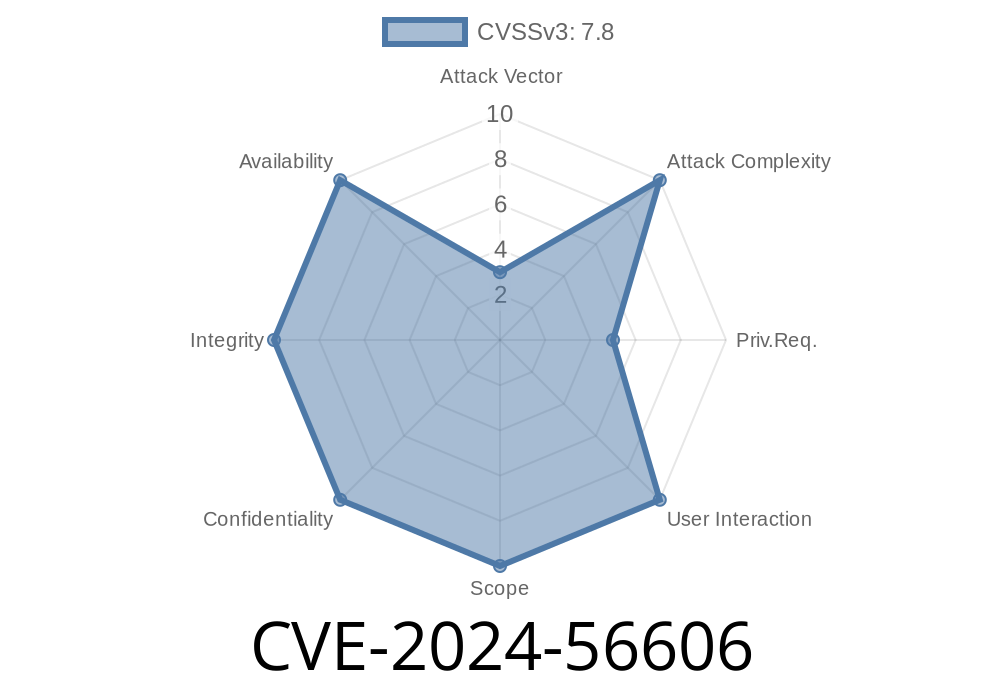On June 10, 2024, a severe security vulnerability was patched in the Linux kernel's AF_PACKET networking code. Known as CVE-2024-56606, this flaw could open systems to exploitation through a use-after-free bug—one of the most dangerous kinds of memory errors in operating systems. This post will break down what happened, how it can be abused, and how the Linux community fixed it. We'll also walk through relevant code, practical risks, and point to helpful resources for further study. If you run or maintain Linux systems, keep reading.
What Is AF_PACKET in Linux?
The AF_PACKET socket interface allows programs to send and receive packets directly at the device layer (OSI Layer 2). It's often used for network sniffing tools and custom networking protocols. Because this interface interacts so closely with kernel memory, mistakes here can be critical.
About the Flaw: How CVE-2024-56606 Works
The heart of the issue lies in the kernel's packet_create() function. When you create a new packet socket, packet_create() sets up a new socket object (sock) and its related kernel structure (sk). This allocation is handled by the sock_init_data() function.
The problem
If an error occurs _after_ calling sock_init_data() but before the function completes, packet_create() would explicitly free the sk object. However, the user-space sock object still believes it's connected to the now-freed sk structure—that's a "dangling pointer." Further use by kernel or user code can result in a use-after-free (UAF): the kernel accesses freed memory, which an attacker might have re-filled with malicious data.
This can lead to privilege escalation, data leaks, or system crashes. Since AF_PACKET is widely available on unprivileged Linux servers, it's a real danger in multi-user environments.
The core problematic pattern looked roughly like this
struct sock *sk = NULL;
int err;
// Allocates sk and links it to sock
err = sock_init_data(sock, &sk);
if (err) {
goto out; // Problem after sk has been attached
}
// Further operations...
out:
if (sk)
free(sk); // Frees sk, but sock->sk still points there!
return err;
At this point, sock->sk is a dangling pointer. Later code may use it, accessing memory that’s already been put back into the allocator’s pool.
What’s the Fix?
The patch, committed by kernel developers, ensures the relationship between sock and sk is consistent throughout the error path. Rather than only freeing the object, the code sets the pointer back to NULL after an error:
out:
if (sk) {
free(sk);
sock->sk = NULL; // Clear dangling pointer
}
return err;
Or, more typically, the error path now avoids manual freeing altogether, letting the higher-level socket subsystem clean up safely, or uses an equivalent helper that undoes initialization and detaches on error.
Patch reference:
- LKML Patch: af_packet: avoid erroring out after sock_init_data() in packet_create()
- Git commit (kernel.org) – replace <patch-commit-id> with the correct one when known
Exploiting this bug in a real-world case would generally require
1. Access to AF_PACKET sockets: Usually available to unprivileged users on many Linux installations.
2. Triggering error after sock_init_data(): An attacker crafts a socket so that sock_init_data() runs, but a later operation (bad arguments, resource exhaustion, etc.) fails.
3. Heap Spraying: Immediately after the socket error and object free, the attacker sprays the kernel heap hoping their fake data is allocated in the same place just freed.
4. Abusing the Reused Pointer: By making the kernel act on the now-dangling sock->sk pointer, the attacker can induce the kernel to read or write memory they now control.
This "time-of-check-to-time-of-use" (TOCTOU) pattern is a classic for kernel hackers. In some cases, attackers can hijack kernel control flow or escalate privileges.
This is simplified pseudocode for illustration:
int fd = socket(AF_PACKET, SOCK_RAW, htons(ETH_P_ALL));
// Trigger error in packet_create() after sk is attached
if (/* error triggered here */) {
// Freed sk is still attached
// Heap spray: allocate/free memory in userland to influence kernel heap
for (int i = ; i < N; i++)
spray_sock(i);
// Use-after-free happens soon after
}
If the attacker can guess the kernel heap layout well (notoriously hard but possible), they can potentially get the kernel to execute their fake data—sometimes even leading to code execution at kernel level.
Data Leakage: Reading kernel memory could expose secrets or credentials.
Any system multitenant or exposed to untrusted users should patch this pronto.
Affected Kernels: Multiple versions prior to the patch
- CVE Entry: CVE-2024-56606 (NVD)
- Upstream Patch/Discussion:
- LKML Patch Discussion
- RedHat Security Advisory (as available)
Update ASAP: Apply the latest kernel available for your Linux distribution.
- Restrict AF_PACKET: If possible, limit who can create AF_PACKET sockets, especially on multi-user systems.
- Monitor your kernels: Use tools like syzkaller and security mailing lists to stay ahead of these bugs.
Closing Thoughts
Kernel bugs like CVE-2024-56606 highlight the importance of careful error-path handling in C. A single missed pointer cleanup can grant immense power to attackers. The Linux community’s quick response and strong code review helps keep billions of devices secure—just make sure you keep your kernels up to date!
Additional resources
- Linux Kernel Source Code (kernel.org)
- Kernel Newbies—Security Bugs
- More on Use-After-Free
*Exclusive coverage and analysis by [YourName or Site]*. Please contact us for comments or corrections.
Timeline
Published on: 12/27/2024 15:15:20 UTC
Last modified on: 02/11/2025 16:15:45 UTC
